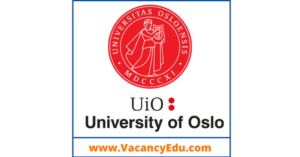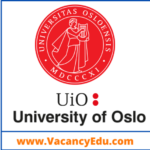University of Oslo, Norway invites online Application for number of Fully Funded PhD Degree at various Departments. We are providing a list of Fully Funded PhD Programs available at University of Oslo, Norway.
Eligible candidate may Apply as soon as possible.
(01) PhD Degree – Fully Funded
PhD position summary/title: Doctoral Research Fellow associated with the project “Dressing the Saints”
How would you dress a saint in art? Working within a historically unparalleled amalgam of an interconnected world and regional religious- and legal reforms, Netherlandish artists active at the dawn of the ʻfirst globalisationʼ were among the first to create consummate solutions to this question. Re-conceptualizing hermeneutical geographies they ordered anew the ever-expanding ʻworld of thingsʼ into their religious scenes. The recently funded project “Dressing the Saints: Gendering and Othering in Netherlandish Art at the Dawn of a Globalized World” (DRESS) provides a novel research agenda for art history and material culture studies, working from the hypothesis that before the conception of non-European lands as an ʻagreeable exotic worldʼ, all textiles enrobing bodies of the heavenly hosts harboured dynamic and flexible ontologies.
Applying a multidisciplinary approach that cross-fertilizes art history, Kleiderkunde (visual anthropology), archival studies, careful interpretation of data from recent advances in art technology and re-created historical artistic practices on art works, DRESS breaks new methodological ground by (1) highlighting the agency of the artist, as painter, sculptor and poet; and by (2) probing the interpretive potential from the unheeded descriptions of costumes worn by the saintsʼ ʻavatarsʼ in religious plays. The project is divided in three inter-connected work packages: “Beyond Allure: Dressing the Saints in Netherlandish Altarpieces, 1480-1530” (WP1), “Dressing the Other: The Black Magus in Netherlandish Art, 1480-1530” (WP2), “The Material Magdalene in the Early Modern Parish” (WP3), and a coda, “ʼAll that Arachneʼs Art Produces Fullyʼ: Netherlandish Poet-Painters on Textile Metaphors” (WP4).
Deadline : 26th October 2025
(02) PhD Degree – Fully Funded
PhD position summary/title: Doctoral Research Fellowship associated with the ERC-funded project “ECOART”
The doctoral research fellowship is available for a dissertation project that focuses on the artistic use and visual representation of geological resources such as gemstones, clays and metals in Mughal India. The focus of the dissertation will be a comprehensive investigation of the extraction, exchange, and artistic uses of one or more geological resources for example through research on extant artifacts that implement mined goods as well as visual documentations of mining itself. The dissertation will tackle how selected geological resources informed aesthetic practices in the Mughal Empire and beyond and how knowledge on clays, gemstones, metals or other mined goods was developed and articulated in art and artisanship. Possible examples include but are not limited to mined pigments in Mughal painting such as ground malachite and gold powder; jade, rock crystal, diamonds, rubies, and other gemstones used by Indian craftspeople in the making of collectible and wearable objects; Indo-Portuguese silverworks and other examples of metalwork from workshops across highly cosmopolitan sites like Gujarat and Goa.
Deadline : 15th October 2025
View All Fully Funded PhD Positions Click Here
(03) PhD Degree – Fully Funded
PhD position summary/title: Doctoral Research Fellowship in Developmental Psycholinguistics
The doctoral candidate will work on an individual research project within Working Package 1, which aims to understand foreign-accent processing by examining neural dynamics, individual factors, and their impact on cognition across the lifespan. The individual research project will focus on the role of early accent exposure in children’s cognitive and language development, investigating the mechanisms and dynamics of accented speech processing. While some studies have shown that exposure to linguistic diversity in early childhood can lead to delayed word recognition and comprehension, other research suggests potential benefits from early exposure to accented speech.
The candidate will evaluate the effects of regional versus foreign-accented exposure in early childhood on the development of lexical representations and cognitive skills. Specifically, the project will explore the cognitive costs associated with accent adaptation and accent switching. To address these research aims, the successful candidate will employ eye-tracking techniques. The work will take place in the Socio-Cognitive Lab, which is equipped with child-friendly eye-tracking facilities and a welcoming room, among other amenities.
Deadline : 14th November 2025
(04) PhD Degree – Fully Funded
PhD position summary/title: PhD Fellowship in Computational Systems Immunology
The candidate will develop and employ a variety of computational biology techniques to perform antibody design both on the sequence and structural level, developing and employing machine-learning tools for predicting antibody-epitope binding. In silico antibody design is a long-standing computational and immunological problem. Improving computational methods for antibody recognition is crucial for the development of personalized and precision medicine approaches such as next-generation infection, cancer, and autoimmune immunodiagnostics and immunotherapeutics. The candidate will be expected to closely collaborate with machine learning experts, statisticians, computational and experimental immunologists, as well as clinicians.
The Greiff Lab focuses on the quantitative understanding of adaptive immune receptor (antibody and T-cell receptor) specificity using high-throughput experimental and computational immunology combined with machine learning. The long-term aim is to conceive in-silico novel immunodiagnostics and immunotherapeutics using the disease-diagnostic information and therapeutic potential that is directly encoded into adaptive immune receptors. The advent of high-throughput sequencing has enabled an unprecedented accumulation of big immune repertoire sequencing data. However, as of yet, we lack the computational methods that help us decode the immune grammar that translates immune sequencing data to immune state diagnosis and prediction of antigen binding. We believe that learning to read and write the immune repertoire language is key for the development of entirely novel, nature-inspired precision medicine immunodiagnostics and immunotherapeutics. Recent publications by Dr. Greiff may be found on google scholar.
Deadline : 15th October 2025
(05) PhD Degree – Fully Funded
PhD position summary/title: PhD Position – Biomat
We are seeking a candidate interested in debridement and the management of infected dental implants. This PhD position is part of the European Doctoral Network “SHIELD” (Strategies for Healing Implant-associated infections and Enhancing Longevity in Devices). SHIELD offers an exciting opportunity for 16 early-career researchers to contribute to transforming the management of infections associated with medical implants. Focused on addressing the challenges posed by implant-associated infections (IAIs), SHIELD aims to deepen our understanding of IAI mechanisms and develop innovative antibacterial biomaterials to improve patient outcomes.
Structured around three core scientific pillars—regenerative medicine, biomaterial science, and translational research models—SHIELD supports research on therapeutic strategies, novel antimicrobial materials, and experimental models that bridge laboratory discoveries to clinical applications. The program emphasises interdisciplinary collaboration across orthopaedics, otology, and odontology, integrating basic research with preclinical and clinical studies.
Deadline : 7th October 2025
Polite Follow-Up Email to Professor : When and How You should Write
Click here to know “How to write a Postdoc Job Application or Email”
(06) PhD Degree – Fully Funded
PhD position summary/title: PhD Position – Serotonin Signaling in 3D Tissue Models
The position is ideal for candidates eager to contribute to the rapidly evolving area of cell signaling in functional tissue reconstruction and regenerative medicine. Collaborative opportunities with clinical and computational research teams will also be available.
The successful candidate will use a robust and physiologically relevant 3D spheroid model, closely replicating the human bone microenvironment. They will be trained in a broad range of high-impact techniques, including 3D culture systems, pharmacological modulation of signaling pathways, spatial gene expression profiling, and bioinformatic analysis.
Deadline : 9th October 2025
(07) PhD Degree – Fully Funded
PhD position summary/title: PhD Research Fellow
Applications are invited for a PhD position at the Leknes Affective Brain lab (www.affectivebrains.com), Department of Psychology, Faculty of Social Sciences, University of Oslo, Norway. The position is intended for a fixed term of appointment 60 % over five years. The starting date in the position is set to January 2026.
The position is associated with the project: «The full spectrum of opioid effects», funded by an ERC Consolidator Grant. The candidate would be responsible for designing and implementing a single-case experimental design (SCED/N-of-1) clinical trial of patients treated with opioid analgesics for chronic pain. The aim of the project is to generate a new individualized framework for clinical research and to determine treatment effects at the level of each patient in a double-blind, randomized controlled manner.
Deadline : 15th October 2025
(08) PhD Degree – Fully Funded
PhD position summary/title: PhD Research Fellow in Deep learning for imaging
You are keen on contributing to new advances in deep learning methodology for earth observation. You will work on deep learning methods for detection of oil spills in the ocean based on satellite imagery. A key focus will be to develop oil spill segmentation approach based on optical sensors, and how this can be integrated with SAR sensors, current satellite imagery, previous observations in the area, weather parameters like wind speed and direction, and prior knowledge about the way oil spills and natural phenomena in the ocean can appear given the observed data. The models can build on recent research results in foundational neural network models.
The work will be done in collaboration with Kongsberg Satellite Services in Tromsø. The position is located in Oslo, but regular visits to Tromsø are expected.
Your interests are in neural networks research and environmental monitoring. You have a strong motivation to both contribute to new methods in neural networks, and to develop models suited to monitoring the marine environment.
The position is in the Digital Signal Processing and Image Analysis (DSB) research group, Section for Machine Learning, Department of Informatics. For more information about the position, see:
Open posititions at Visual Intelligence
You will be part of Visual Intelligence and the DSB research group. We expect that you will engage in collaborative research with other members of the centre and the research group. You will collaborate with user partners within Visual Intelligence, to contribute to the centre’s seminars, to collaborate across innovations areas within the centre, and to seek collaboration between the research partners within the centre. You will be part of a network of young researchers in deep learning in the Visual Intelligence Graduate School.
Deadline : 21st October 2025
Click here to know “How to Write an Effective Cover Letter”
(09) PhD Degree – Fully Funded
PhD position summary/title: PhD Research Fellow in geology
The Department of Geosciences seeks a highly motivated and self-driven geoscientist that can enrich and strengthen the Department in subjects related to alluvial fan sedimentology, architecture, and petrography. The position will focus on developing new concepts in catchment–alluvial fan dynamics within a structural framework, with emphasis on sedimentology and petrography, and integration of complementary datasets, including seismic data. The main workload will involve field investigations, subsurface data analysis (core and borehole), the integration of new data and concepts with existing seismic models. The project will involve collaboration with industry partners and other scientific teams.
Deadline : 13th October 2025
(10) PhD Degree – Fully Funded
PhD position summary/title: PhD Research Fellow in Sociology/Human Geography and Organizational Theory
We seek a candidate with an interest in and the potential to contribute to the development and teaching of organizational theory, institutional change and work life studies at the department. We value the contribution of young scholars to the academic environment and study programmes at the department and encourage candidates with a desire to participate actively in departmental life to apply.
Applicants should have research interests that resonate with ongoing research at the department, with an emphasis on politics, organization and work themes. The fellow is expected to pursue independent research under supervision, as outlined in their submitted project proposals. Candidates are expected to demonstrate through their application letter and project proposal how they will contribute to the development of organizational and work life studies in relation to the MA-programme in organization, leadership and work life studies at the Department.
The position requires participation in the Faculty of Social Sciences’ organised research education programme (PhD programme) and the completion of a doctorate in sociology or human geography. The candidate who is hired will automatically be admitted to the PhD programme.
Deadline : 1st November 2025
Connect with Us for Latest Job updates
About The University of Oslo, Norway – Official Website
The University of Oslo, until 1939 named the Royal Frederick University is the oldest university in Norway, located in the Norwegian capital of Oslo. Until 1 January 2016 it was the largest Norwegian institution of higher education in terms of size, now surpassed only by the Norwegian University of Science and Technology. The Academic Ranking of World Universities has ranked it the 58th best university in the world and the third best in the Nordic countries. In 2015, the Times Higher Education World University Rankings ranked it the 135th best university in the world and the seventh best in the Nordics. While in its 2016, Top 200 Rankings of European universities, the Times Higher Education listed the University of Oslo at 63rd, making it the highest ranked Norwegian university.
The university has approximately 27,700 students and employs around 6,000 people. Its faculties include (Lutheran) theology (with the Lutheran Church of Norway having been Norway’s state church since 1536), law, medicine, humanities, mathematics, natural sciences, social sciences, dentistry, and education. The university’s original neoclassical campus is located in the centre of Oslo; it is currently occupied by the Faculty of Law. Most of the university’s other faculties are located at the newer Blindern campus in the suburban West End. The Faculty of Medicine is split between several university hospitals in the Oslo area. The university also includes some formally independent, affiliated institutes such as the Centre for International Climate and Environmental Research (CICERO), NKVTS and the Frisch Centre.
The university was founded in 1811 and was modeled after the University of Copenhagen and the recently established University of Berlin. It was originally named for King Frederick VI of Denmark and Norway, and received its current name in 1939. The university is informally also known as Universitetet (“the university”), having been the only university in Norway, until 1946 and was commonly termed “The Royal Frederick’s” (Det Kgl. Frederiks), before the name change.
The Nobel Peace Prize was awarded in the university’s Atrium, from 1947 to 1989 and will be so again in 2020, making it the only university in the world to be involved in awarding a Nobel Prize. Since 2003, the Abel Prize is awarded in the Atrium. Five researchers affiliated with the university have been Nobel laureates.
Disclaimer: We try to ensure that the information we post on VacancyEdu.com is accurate. However, despite our best efforts, some of the content may contain errors. You can trust us, but please conduct your own checks too.
Related Posts




